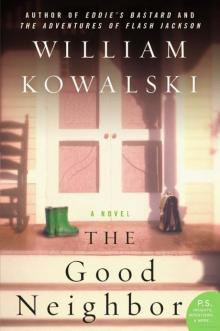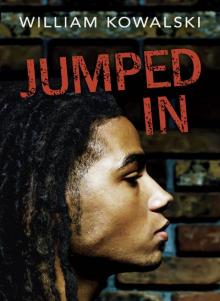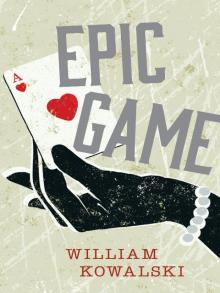- Home
- William Kowalski
The Good Neighbor Page 13
The Good Neighbor Read online
Page 13
“You really should stop smoking this stuff,” she said. “You’re gonna get into trouble.”
“With who?” he snorted. “Mommy and Daddy?”
“It’s your health I’m really worried about. Once in a while is okay, but you do it too much.”
The Good Neighbor
131
“It’s part of my personality,” said Michael, unperturbed, not looking up from his comic book. “It’s who I am. I do what I do, and you do what you do, and nobody should be judging anybody.” “It’s just not good for you, that’s all,” she said. “I don’t like to
see you hurting yourself.”
“Remember when we used to sit up and read under your covers with the flashlight?” Michael asked.
“You didn’t read. You made me read to you.”
“That’s because I couldn’t read. The letters were all backwards.” “I know. Poor kid.”
“Don’t poor kid me.”
“I can’t help it,” said Francie. “You’re so cute.”
“Shut up.” He lay on his back and tried to read that way, then abruptly sat up again and threw the comic book to the side. “It’s still really hard,” he complained. “Mom and Dad always thought I was faking it. They thought I was lazy.”
“They know better now,” she said. “That you had a disease. It wasn’t just in your head.”
“Whatever,” he said. “They’re not exactly role models them selves.”
“What do you mean?”
“I mean, of how to live a perfect life. Dad’s a racist prejudiced bigoted asshole. If he met some of my friends he’d have a heart at tack.”
So would I, probably, Francie thought, though she knew Michael was right about their father.
“And Mom—she’s just a country club gal. Christ. Take them out of Indianapolis and they’re like fish out of water. All they do is find fault with everything. Complain. Did I ever tell you about the time they came to visit me at school, what a nightmare that was? Dad couldn’t believe I had a black roommate. Like, he thought I was playing a joke on him. He thought Al worked there. I wanted to kill him.”
“I know. I heard all about it from Mom. They do the best they
132 WILLIAM KOWALSKI
can, is all. They’re middle-aged Midwesterners, Michael. They were raised a certain way, to believe certain things. You really can’t change people, much as you might want to.”
“Unfortunately.”
“Now listen,” she said. “What were you telling me about be fore, when the power went out?”
“What?”
“Before. You sounded like there was something wrong. Like you were about to tell me there’s something going on. This is the third time I’ve asked you now. So, out with it.”
“Oh, yeah.” Michael sighed heavily. “Well, I, uh . . . I got into a little mess in Denver.”
“What kind of mess?”
“Well, after I hooked up with Yolanda, she took me over to these guys’ house where she lived sometimes, right? And so I ended up staying for a few weeks. They were really cool to me. I ran a few errands for them, you know. Helped out a little. But, ah . . . well, there was this raid, right? The whole street was all blocked off with cop cars and shit. I missed it just by a second. I was just coming back from a . . . an errand, and I saw all the sirens in the street, so I just kept on going. Lucky is not the word, really. I was like, holy shit! You never fucking know, man. I came this close to getting popped.”
“And you were selling drugs for them,” Francie said.
Michael stared at her, as if amazed by her mental powers. “No, not really, Sissie, I was just—”
“‘Running errands,’ ” she finished. “Right?”
“Well, I never actually saw what I was delivering,” said Michael, “so it’s not my fault, right? They can’t prove anything.”
“Michael, this is serious! Really serious! Do the police know who you are?”
“Well, here’s the messed-up thing about that. The day before the raid, this meter reader came to the house, right? And he asked me if I lived there, and I said yeah, sort of, and he asked if I could
The Good Neighbor
133
give him my name just so he could put it down as the person he talked to, and I said sure, and like an idiot I let him see my driver ’s license. And then he read the meter and went away.” Michael paused, thinking. “He was a nice guy, actually.”
“But he wasn’t a meter reader.”
“I don’t think so. I think he was a cop. In disguise, like.”
“Yeah, well, Michael? For future reference, meter readers don’t ask to see ID.”
“I know that now, Sissie.”
“So, they know who you are. They have your address.” “My old school address. That’s what’s on my license.” “Still. They have your name. They can track you.”
“I know,” Michael said. “That’s why I came out East again. I sorta need to lay low for a while. Don’t tell Colt, okay? He’ll kill me.”
“Believe me, I won’t say a word. But Michael . . .” “Yeah?”
“If the cops show up here . . .”
“I know. I don’t even wanna think about it. I doubt they will, but still, you never know. I was gonna ask if . . . I mean, I figured I’m better off with you guys for a while, even with the caveman downstairs. Do you think I could crash with you? I mean like, longer than a few days? Like... indefinitely?” He reached out and took one of Francie’s hands in his, interlacing their fingers. “I’m re ally fucked here, Sissie. I don’t know what to do.”
“Colt won’t like it,” said Francie. “I know, but . . .”
“But who cares,” said Francie. “You’re my brother. It’s my house, too, no matter what he says. He’s going back to the city on Monday, anyway. And he’ll be gone until Thursday.”
“Right,” Michael said, sighing with relief. “I forgot that.”
“So if we can make it through the rest of this week and the weekend, it can be just the two of us. For a few days, at least.”
“How romantic,” said Michael. “Just like the old days. Listen, there’s something else, too.”
134 WILLIAM KOWALSKI
Francie rubbed her face tiredly. “Something else? How can there be more?”
“You know how I was saying I had to just keep on going in stead of stopping, when I saw the cops on their street? The day of the bust?”
“Yeah?”
“Well,” said Michael, “that was because I just happened to have ten kilos of dope in the car at the time, and I didn’t know what else to do with it. So . . . I kind of brought it all with me. It’s in my bus now.” He looked at her with a self-satisfied expression. “There,” he said. “Now I’ve come clean.”
“Oh, my God, Mikey,” said Francie, turning pale. “Tell me you’re joking.”
“No,” said Michael. “I wish I was.” “What on earth are you—”
“I’m gonna give it back,” he said. “And how are you going to do that?”
“Well,” Michael said, “I figure they’re going to look me up sooner or later, just like you said. Not the cops. I mean, the guys who own it. It’s worth a lot of cabbage to them. And when they find me, it’s all going to be there. Every bit. I’m not going to touch any of it. And I can just sort of hand it over and explain the whole thing, and hopefully they’ll understand. I mean, these aren’t like cold-blooded killers or anything. They’re nice guys. I know these guys.”
“You knew them for . . . how long? A few weeks?” “Yeah. Something like that.”
“And on that basis you would trust them with your life.” “Sissie, come on. This isn’t Scarface we’re talking here. It’s not
Al Capone. It’s just . . . guys.”
“Guys who deal very large amounts of drugs.” “Well, yeah.”
Francie put her head in her hands.
“Michael,” she said, “you’re never going to learn.”
The Good Neighbor
/> 135
“I know,” Michael said—sheepish, grinning, mischievous. “But I’m still really cute, right? Aren’t I? And aren’t you proud of me for coming clean?”
“You have to get rid of it,” Francie told him. “I don’t care how, but you have to. Jesus, Michael, you can’t have that much dope sitting around on our property! What the hell were you thinking? Do you know we could lose our house if the police found it here?”
“Sissie, I told you, I was running—”
“You’re always running,” said Francie. “You never stop and think. What if what you’re running into is worse than what you’re running from? And what about how this could affect other people’s lives? You have to start thinking about that, too. Or eventually you’re going to have no one left to help you.”
Michael was silent. He stared at the floor, sulking. “Get rid of it,” said Francie. “Promise me.”
“But what am I supposed to do with it?”
“I don’t care. Dump it out at sea. Bury it. Just don’t try and sell it, whatever you do. You’ll get caught, and that will be the end of you. You’ll go to jail for a long time, and no one will be able to get you out. Promise me.”
“All right,” said Michael. “I promise.”
“And if you said you’re not going to touch any of it, then what are you smoking right now?”
“Well, they won’t mind me helping myself to a little,” said Michael. “I mean, after all, I did save it from the cops. And ‘Thou shalt not muzzleth the ox that treadeth the corn.’ Remember that one from the Bible? Ha ha! And you thought I didn’t know any thing!”
Francie covered her face in her hands. Then she grabbed the joint out of Michael’s fingers and stubbed it out on her tea saucer.
“Stop,” she said. “Just stop.” “Are you mad?”
“Yes. I’m mad.” “How mad?”
136 WILLIAM KOWALSKI
“Really mad.” “I’m sorry.”
“Oh, well,” Francie said, “in that case, I guess everything’s all right.” She sighed. “Let’s go to sleep. I’m exhausted.”
❚ ❚ ❚
When they went downstairs, Colt had disappeared. Michael dragged his air mattress in from the bus, trudging through snow that had now piled up in drifts over a foot high. He set it in front of the fire, and he and Francie snuggled in on top of it together, a couple of blankets thrown over them, using their arms for pillows. Francie, chilled, was still wearing her sweatshirt. She rolled over now and put one arm over her brother, who already slept the deep sleep of the drugged. She almost managed to drift off, despite the noise made by Colt, who was apparently stomping from room to room on the third floor, shoving around the few articles of fur
niture they’d brought with them.
What the hell does he have to be mad about? she thought. He’s not the one who’s just had his heart ripped out of his chest. He’s not the one who’s been gutted.
And yet it soothed her, in an odd way, to know that he was feeling something. At least he wasn’t sitting there ignoring her and the world around him, watching television, which was what he always did after an argument.
The last thing of which she was aware was that the power came back on. Light flooded the room, and beneath her, Francie could hear the faint hum of the polybrachial furnace as it sprang into life once more. She got up quickly, shivering, and turned the overhead light off, then dove back onto the mattress. The furni ture noises upstairs stopped abruptly and were replaced by the ticking of the vents as the house began to warm again. Comforted by this, and by her brother pressed against her, she slept.
13
The Diary of Marly Musgrove
As is common with secret doors, Francie found hers by acci dent.
The day had begun with her waking sometime before sunrise. Michael was snuffing and puffing gently beside her, his arm flung over his face as if still trying to protect his battered nose. She slid off the air mattress carefully, so she wouldn’t wake him, and waited for a moment on her hands and knees to see if he would stir. The house was dark and cold—even though the furnace was struggling gamely—but it was far from silent. Mysterious creaks and groans came from every beam, and the floor crackled under her feet as she went to her pants and felt in her pocket. Already the hair was rising on the back of her neck, the same way it did when she was watching a scary movie, or when she imagined that she was being watched by spirits. And yet she was not afraid.
On her key chain was a tiny flashlight, the kind you squeezed in the middle. Francie took it out of her jeans pocket now and shone it around the living room, slicing through the blackness as if it were jungle undergrowth. She was an explorer; she would do
138 WILLIAM KOWALSKI
some exploring. She padded slowly through the other living room and into the den. She had no idea what time it was, but the sky was still black. She marveled once again at the deep, dark sheen of the den’s oak paneling, ran her fingers over its smooth richness. Then she went into the kitchen, shivering as her feet came into contact with the frigid slate, simply looking around at how differ ent everything seemed under the feeble beam of the flashlight.
The uncharted second floor beckoned her next, with its long hallway of closed doors. Here were the bedrooms, which must once have been full of children but now were empty of every thing, even beds. The rooms were narrow and tight, each with a single window at the end. There were six of them. She stuck her head into each, like a prison warden. Through a window at the end of the hall she caught a glimpse of a single high-flying cloud, no bigger than a man’s fist, reflecting the first pinks of the rising sun as it spilled over the eastern edge of the world. At the same time she became aware of a raucous and stentorian snoring from upstairs. The hair on her neck rose again. Colt. Oh yes. She’d al most forgotten about him.
Francie tiptoed upstairs to the third floor and looked tenta tively into the master bedroom. There he was, sprawled diago nally, bachelor-wise, on the mattress that they’d brought from the guest bedroom, just his nose visible as it emerged from under the edge of the duvet. Look at him, sleeping away as if he hadn’t a care in the world, she thought. How dare he be so relaxed? She would just have to fix that.
She picked up the empty suitcase that sat on the floor and thunked it down again, but he didn’t move. Vindictiveness for yesterday’s crimes surged in her suddenly, and she felt a strong urge to throw something. She picked up the suitcase again and flung it with all her might into the open closet, where it smacked heavily against the wall. Still, he didn’t move. Intending now to drop it on his head, or something like that, she went into the closet to retrieve the suitcase and, turning on the light, saw where
The Good Neighbor
139
it had struck the wall. It had left a mark, and when she touched it to see if it was permanent, she felt the wall itself give slightly. Oh, dear, she thought, all anger fled now, I’ve broken something. And, pressing experimentally upon the spot, a door about three feet tall swung inward.
Francie sank to the floor in astonishment. Childhood memo ries, again possibly hers, probably not, flooded her mind: a wardrobe in England, with a Christly lion on the other side. Sweet nostalgia overcame her as she remembered: yes, there was a better place than this, and she could still find it, if only she looked hard enough.
And now, apparently, she had.
For some moments she was too surprised to do anything. Colt had finally begun to rustle in the bed. Francie hastily pulled the closet door shut behind her. Now she didn’t want him awake, for he would ruin this, too. Crouching, she reached up and yanked the chain that turned off the closet light. Then, suddenly timid, she shone her flashlight into the little doorway that had just mag ically revealed itself.
“You have got to be kidding, house,” she whispered. “No way.
No way.”
But the house wasn’t kidding. Her light revealed a cramped, narrow stairway, heading down. It was a tight fit, and ahead of her lay utter dar
kness, but without a second thought she ducked in.
The air in the stairway was close and musty, and, unbearably, it was full of cobwebs, which to her had always felt like skeins of human hair—dead human hair. She couldn’t bear the way they clung to her. But for something as unexpectedly wonderful as a se cret stairway, she could put up with it.
Down, down she went, shining the finger-thin beam ahead of her. She was aware that the stairway wound around once and then twice, by which time she was disoriented. Her breath came quickly as she wondered what she would find at the bottom of it.
140 WILLIAM KOWALSKI
Surely it would be marvelous; surely it would change her life, like an angel’s wing brushing her forehead. There would be talking ani mals, and witches, both good and bad. Perhaps she would find a whole race of beings who’d been waiting patiently for centuries for her to come lead them to freedom. Her blood boiled with a fever she hadn’t known since girlhood.
And then, quite suddenly, she found herself in a little room. She thought that she must be back on the first floor by now,
only it was a part of the first floor that none of them had ever seen. The room was no more than five feet tall at its highest end; at the other, it petered out into the point of a triangle. Judging by the ziggurat-shaped ceiling, she was underneath the main stair way. If she stretched her arms out to either side she could touch the walls simultaneously. So it was a crawl space, more or less—a hiding place. It could be nothing else. Obviously, no one was sup posed to know it was there.

 The Good Neighbor
The Good Neighbor Eddie's Bastard
Eddie's Bastard Jumped In
Jumped In Something Noble
Something Noble The Adventures of Flash Jackson
The Adventures of Flash Jackson Just Gone
Just Gone The Way It Works
The Way It Works Epic Game
Epic Game